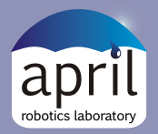
One of the fundamental challenges in robotics is data-association: determining which sensor observations correspond to the same physical object. A common approach is to consider groups of observations simultaneously: a constellation of observations can be significantly less ambiguous than the observations considered individually. The Joint Compatibility Branch and Bound (JCBB) test is the gold standard method for these data association problems. But its computational complexity and its sensitivity to non-linearities limit its practical usefulness.
We propose the Incremental Posterior Joint Compatibility (IPJC) test. While equivalent to JCBB on linear problems, it is significantly more accurate on non-linear problems. When used for feature-cloud matching (an important special case), IPJC is also dramatically faster than JCBB. We demonstrate the advantages of IPJC over JCBB and other commonly-used methods on both synthetic and real-world datasets.
@inproceedings{olson2012iros,
TITLE = {IPJC: The Incremental Posterior Joint Compatibility Test for Fast
Feature Cloud Matching},
AUTHOR = {Edwin Olson and Yangming Li},
BOOKTITLE = {Proceedings of the {IEEE/RSJ} International Conference on Intelligent
Robots and Systems {(IROS)}},
YEAR = {2012},
MONTH = {October},
KEYWORDS = {SLAM, data association},
}